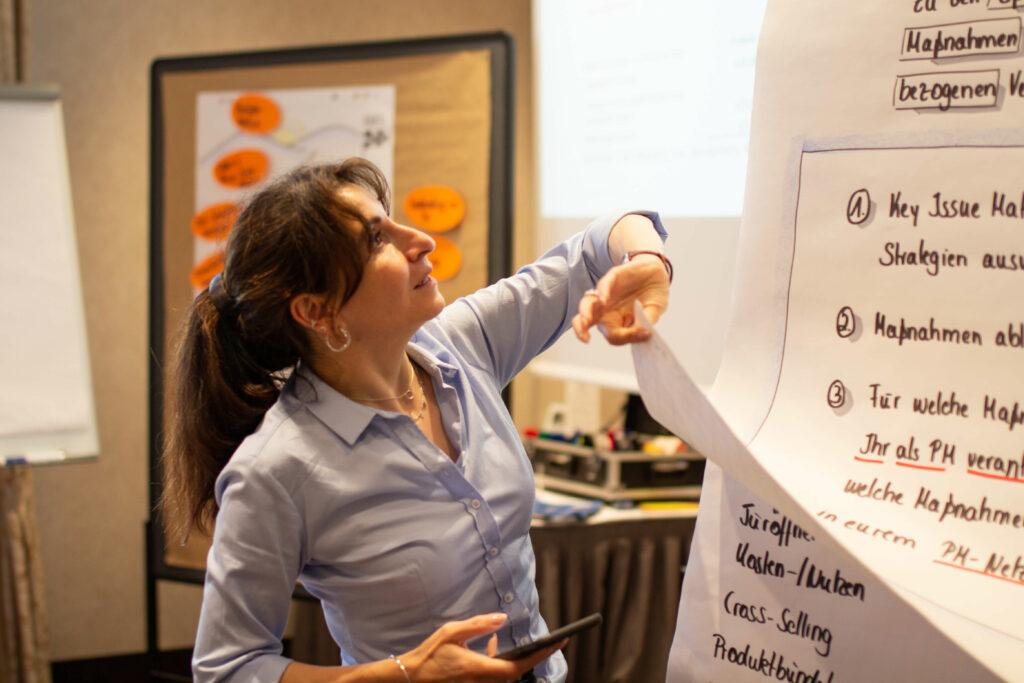Consulting
Product Management Consulting that Fosters Innovation
Product management Consulting
Product Management Consulting that Fosters Innovation
Medium-sized companies generally have hundreds or a few thousand employees on their payroll and in most cases they have grown organically. That means that the sales team listened to the demands of their customers and the company worked to meet those demands. The order was fulfilled and then it was on to the next job. In principle, reacting to the customer demands is the right thing to do.
In the 19th century, Henry Ford said that if he had asked people what they want, they probably would have said a faster horse. His customers surely wouldn’t have been able to imagine that just two hundred years later, there would be cars that can accelerate from zero to a hundred in about 3 seconds, let alone that there would be vehicles that fly. One hundred years ago, nobody could have imagined that people in almost every corner of the world would be able to talk to each other without being anywhere near the other person. And who would have thought just a decade ago that we would be talking to our power outlets in order to turn on the stereo system, toaster, or the lights?
People tend to keep ordering what they already know. We always evaluate things based on our own experience with them. One of the most important things a successful company must do is fundamentally call things into question.
Serpil Uensal: “The difference between excitement and satisfaction is the difference between success and failure.”
If the customer thinks that he needs a specific product that he already knows, it’s the company’s duty to offer him a range of products that help him solve his problems and overcome his difficulties.
In some companies, the Sales Department has the final say because that’s just how it developed in the company’s history. They always brought new ideas into the company and then new products were developed. And often it turned out that the margins weren’t alright anymore, or they never were any good in the first place. That means the demands are so specialized that only individual customers benefit from the development. And just because the Sales Department doesn’t want to leave their long-term customer hanging, the producer is stuck with the high development costs associated with it.
Not everything has to be developed from scratch. Sometimes it’s enough just to use good observation skills, call in focus groups, conduct customer interviews and user analyses in order to find out where the customer’s proverbial shoe pinches. Asking the right questions and searching for answers are what get product managers on the right track. How can the company’s product management be professionalized in general?
Should the product manager be involved in the development process from the very start when new products are born? If so, then they will need to translate customer demands as well as push for technical developments, and to implement techniques for fostering innovation and creativity in order to bring about new features. The key is to change your perspective. If the supplier sees things through the eyes of the customer and integrates them into the development process, it becomes possible to check if it is ready for the market. Conduct pilot tests, observe, adjust, repeat.
Not the Time for a Blueprint
Product development used to be a long and tedious process. When providing product management consulting to medium-sized companies, Serpil Uensal consults them on how they can improve their performance on the one hand and develop with the close cooperation of the customer on the other hand. This helps ensure that the finished product is not rejected in the end. Every development requires time and energy. Solutions don’t just come as eureka moments under the shower or in passing. That’s why Serpil Uensal encourages her clients to look around at other fields of business every now and then.

Deal or No Deal? Continuous Monitoring for Cost Reduction
“Would you allow your car insurance company to monitor your driving behavior if, in return, you had the chance to profit from a price reduction as a reward for defensive driving? No matter how you personally answer this question, this model is already being used in America. That means there are in fact already customers who accept this offer.” In Germany, some insurance companies and their customers are dumbfounded when they hear about that. Yet this is an offer that is particularly attractive for a specific group of drivers, i.e. for those who inherently drive cautiously. These people welcome the potential savings with open arms.
External Help for an Internal Perspective
In that case, the Product Management or Product Development departments of the American insurance company did the work on their own. The provider discovered something the customer was dissatisfied with and reacted to it. Wherever the customer’s problems can be solved, there is a market that has to be served. It might sound obvious at first for some people, but it is an important point on the agenda for Serpil Uensal’s product management consulting. When companies have been satisfying the same customer requirements for years or even decades, it becomes a routine for them. This routine is then often accompanied by a kind of organizational blind spot, so the Product Management ultimately can’t see the forest for the trees.
Where Does it Hurt?
When Serpil Uensal takes on a consulting project for product management, she puts on her consulting glasses and conducts a situation analysis for each customer. Similar to a visit to the doctor’s office, she looks for what’s ailing your product management. Where does it hurt, where does the shoe pinch? What exactly is the problem? If the customers are complaining and that’s causing the revenues to decline, then you first have to take a look in the mirror. What are the product’s weaknesses? Which characteristics are strengths? But perhaps also: how do the departments work together? How do the interfaces work? In order to create a strong foundation for making good decisions and sound action plans, the strategic options have to be checked and evaluated.
Serpil Uensal
Your Expert
Serpil Uensal
Serpil Uensal is a keynote speaker, trainer, coach, and consultant with over 20 years of experience in marketing, product management, and business development. Her customers include over 100 small and medium-sized businesses, as well as multinational companies.
Serpil Uensal has been active as a trainer and coach for medium-sized companies since 2005. Since then, she has provided more than 20,000 hours of these services to both national and international companies. With her captivating style, she has enthralled over 9,000 participants in her seminars, training sessions, and workshops.
Serpil Uensal is known for her edutainment. She is an animating moderator and a passionate storyteller. She has demonstrated her excellent presentation skills in numerous projects. Local, digital, national, or international: Serpil Uensal understands how to inspire people with her interactive training and how to achieve sustainable results.
Product management
Transform your product management into a center of innovation
- More impact
- More excited customers
- More revenue
What Her Participants Say


